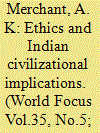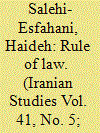| Srl | Item |
| 1 |
ID:
130802


|
|
|
|
|
| Publication |
2014.
|
| Summary/Abstract |
The major civilizations of in human history have been associated with the major religious systems. Some
3,000 years ago Zoroastrianism was the religion of the "glory of ancient Persia," - the Persia that conquered" Babylon, Palestine, Egypt, and the Greek city-states. A few centuries later Judaism was the basis of Hebrew culture, which some philosophers such as Karl Jaspers regards as the greatest in history. And Jewish law has formed the I basis of common law and jurisprudence in countries all over the world. Western culture, until the rise of modem science, was dominated by Christianity. The teachings_ of Islam that burst upon world stage some 1400 years a go preserved and developed the Hellenistic heritage and gave algebra and other sciences. It was probably the greatest civilization the world had seen until the rise of the - Industrial Revolution began to transform Western culture. Today, the tumult of our age of transition is characteristic of the impetuosity and irrational instincts of youth. its follies, its prodigality, its pride, its self- assurance. its rebelliousness, and contempt of discipline.
|
|
|
|
|
|
|
|
|
|
|
|
|
|
|
|
| 2 |
ID:
085331


|
|
|
|
|
| Publication |
2008.
|
| Summary/Abstract |
The ancient Persian empires are denoted as despotic, practicing arbitrary rule while Greece, Persia's archrival during the sixth to fourth century BC, exercised rule of law. This paper uses a contract theory framework to analyze some of the geographical and environmental underpinnings of the existence of rule of law in the city-states of ancient Greece and its absence in Persia. I discuss the role of geographical conditions of land (open plains versus mountains), population pressure, proximity to the sea and form of trade (overland versus overseas) as factors conducive to rule of law in the city-states of ancient Greece and to despotism in ancient Persia. Specifically, the role of trade via land in Persia prior to the fifth century BC is compared to the role of sea trade (alongside with piracy) in ancient Greece. I argue that in ancient Persia monarchs could tax or expropriate much of the gains from overland trade, preventing the accumulation of an independent form of wealth by merchants. In Greece, sea trade alongside the practice of piracy led to gains from trade that could not be easily expropriated by the monarchs and acted as a balancing force vis- -vis the power of the monarchs, creating a basis for rule of law in the Greek city-states.
|
|
|
|
|
|
|
|
|
|
|
|
|
|
|
|